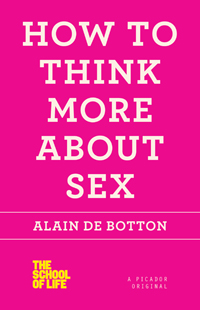 How to Think More About Sex
How to Think More About Sex
by Alain de Botton
Picador, December 2012
192 pages? /? $16? Buy from Picador or Amazon
?
?
?
?
?
?
?
In the middle of Michel Houellebecq?s The Elementary Particles, the narrator makes one of many comparisons between sex and the free market:
?Sexual desire is preoccupied with youth, and the progressive influx of ever-younger girls onto the field of seduction was simply a return to the norm; a restoration of the true nature of desire, comparable to the return of stock prices to their true value after a run on the exchange.?
While Houellebecq has been derided by some as misogynistic and bleak, it is clear that upon reading Alain de Botton?s How to Think More About Sex, a slim volume that should have been titled How to Think More About Heteronormative Sex, the two would be in agreement about at least one thing: as those with partners age, both in their relationships and biology, individual desire for sex decreases until finally, death. In one of the more interesting sections of the book (the other being on pornography,) one of the first in Picador?s ?The School of Life? series, de Botton repudiates the assertion first made by the Masters & Johnson study that states in order for a marriage to be successful, sex should be a constant. Ignoring this trend that was later capitalized upon by sex therapists and then pharmaceutical companies, de Botton argues that a decrease in our sex drive and the quality and quantity of sex is purely normal and is a ?necessary comprise of long-term love.?
This is one of the points brought up in the subsection entitled ?Infrequency,? one of several aspects discussed in the chapter ?Lack of Desire.? The book?s structure of chapters, sections and subsections is easily one of its strong points, allowing for easier reading. Unfortunately, de Botton?s assertion used to market the book: ?We don?t think too much about sex; we?re merely thinking about it the wrong way? is undermined not only by its heteronormative assumptions, but by a narrow focus in its audience and examples that are sometimes anomalies and worse yet, lack physical or historical evidence to back it up. One example of this can be found when discussing impotence: ?Let us propose, though we have little concrete empirical evidence for the claim, that at the dawn of its existence mankind was rarely bothered by impotence.? This admittance of the lack of evidence in a hypothetical situation, thus removed from real-life, often had me wondering whether the author?s authority was akin to that of the second-year undergraduate sexuality students this book would be assigned to.
Besides such Swiss-cheese holes in his arguments and his focus on heterosexuals, which is also made clear by the constant use of hypothetical male-female couples, it is clear this book was written to directly appeal to upper-middle class WASPs. De Botton makes constant references to luxury goods (Dolce & Gabana clothing, The Park Hyatt Hotel, Marni brand shoes) and art history (Caravaggio?s ?Judith Beheading Holofernes? and Manet?s ?Bunch of Asparagus? to name two.) By the time he uses Natalie Portman and Scarlett Johansson as examples of why we prefer one person over another, it comes off as a pathetic olive branch when the book is taken as a whole.
Where de Botton succeeds is bringing up aspects of sexuality that have not been previously discussed as thoroughly as they should be. In the subsection ?Fetishism-Goodness? one hypothetical couple both have fetishes?the female?s being a watch on her partner?s wrist, while the male focuses on his partner?s shoes. To see this examined, even in Freudian terms, was a pleasant surprise as it is rarely discussed in sex manuals, even books like Moregasm, written by the owners of the female-friendly sex shop chain ?Babeland.
In another pleasant surprise, later in the book when religious and secular views are pitted against each other regarding pornography, de Botton defends religion rather than brushing it off, as is often characteristic of contemporary scholars. ?We may not sympathize with what they would wish us to think about in the place of sex, and we may not like the way they go about trying to censor it, but we can surely?though perhaps only after killing many hours online at www.youporn.com- appreciate that on this one point religions have got it right: sex and sexual images can overwhelm our higher rational faculties with depressing ease.?
Moments of dry humor like this, along with his proposal of realistic marriage vows when discussing adultery (?I promise to be disappointed by you and you alone. I promise to make you the sole repository of my regrets, rather than to distribute them widely through multiple affairs and a life of sexual Don Juanism?) add pathos to an otherwise dry argument. While How To Think More About Sex makes a noble effort in its intent, it is highly worth noting that the arguments made and examples provided should be taken with several grains of kosher salt. For many, the cost of what was left out in exchange for something short and more accessible might prove a bit too expensive.
***
Eric Nelson is a writer from Queens, New York. His prose chapbook ?The Walt Whitman House? is available from The Crumpled Press. (http://crumpledpress.org/
Tags: Alain de Botton, Eric Nelson, How to Think More About Sex
Source: http://htmlgiant.com/reviews/how-to-think-more-about-sex/
celebrity apprentice grizzlies bronx zoo crash april 30 wwe extreme rules 2012 vontaze burfict jimmy kimmel
No comments:
Post a Comment
Note: Only a member of this blog may post a comment.